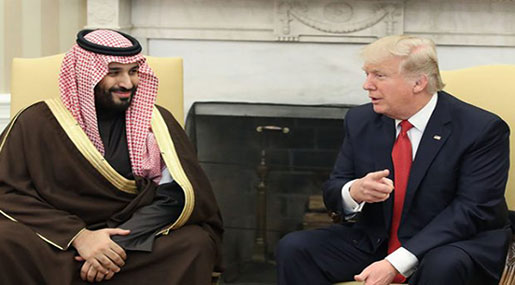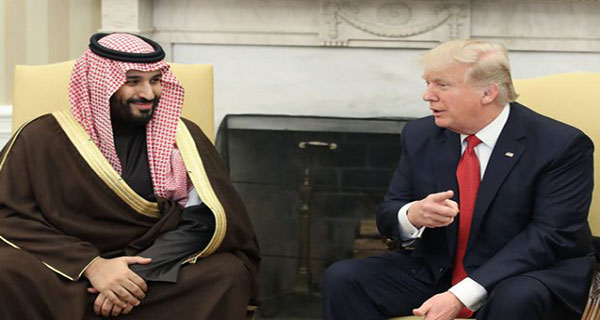
Saudi Arabia is the Top Sponsor of Terrorism, Not Iran

Kurt Nimmo
In March, during a meeting between President Trump and Saudi Arabia's Deputy Crown Prince Mohammed bin Salman, a senior advisor to the prince said the United States and Saudi Arabia have reached a "historical turning point" in relations. The Saudis are encouraged by Trump's hardline on Iran.

"The meeting today restored issues to their right path and form a big change in relations between both countries in political, military, security and economic issues," the senior advisor said in a statement.
The Saudis were further encouraged on April 19 when Secretary of State Rex Tillerson said the Trump administration was in the process of reviewing the lifting of sanctions against Iran. Tillerson denounced the country as a sponsor of terrorism.
"Everywhere you look, if there's trouble in the region, you find Iran," James "Mad Dog" Mattis, Trump's War Secretary, told reporters. "Right now, what we're seeing is the nations in the region and others elsewhere trying to checkmate Iran, and the amount of disruption and the amount of instability they can cause."
The Trump administration has ignored the role played by Saudi Arabia in creating "trouble in the region," trouble that overshadows anything purportedly created by Iran.
Omitted from any official discussion is the Saudi role in creating so-called ‘Islamic terror.' The effort began in earnest in 1973 when the price of oil skyrocketed.
Between 1972 and 1978 the price of oil per barrel rose $9.02, from $3.50 a barrel to $12.52. Saudi Arabia and the Gulf Emirates began to put their windfall to use by funding Wahhabi projects around the world.
In 2003 the Center for Security Policy [CSP] calculated that between 1975 and 2002 the Saudi government spent over $70 billion on international aid. Nearly all the money went to ‘Islamic'-related projects such as building Wahhabi mosques and religious schools. CSP scholar Alex Alexiev characterized the effort as "the largest worldwide propaganda campaign ever mounted" in the history of the world. Saudi charities, including the Muslim World League and its affiliate, the International Islamic Relief Organization, were headed up by Saudi government officials and funded in large part by private Saudi citizens.
"Accompanying the money, invariably, was a blizzard of Wahhabi literature," US News and World Report noted in 2003. "Critics argue that Wahhabism's more extreme preaching-mistrust of infidels, branding of rival sects as apostates, and emphasis on violent ‘jihad'-laid the groundwork for terrorist groups around the world."
The massive funding effort represents "a monumental campaign to bulldoze the more moderate strains of Islam, and replace them with the theo-fascist Saudi variety. Despite being well aware of the issue, Western powers continue to coddle the Saudis or, at most, protest meekly from time to time," writes Yousaf Butt.
An official US diplomatic cable made public by WikiLeaks reveals the US government is well aware of the Saudi effort to spread the influence of militant Wahhabism far and wide. In a cable dated December 30, 2009 then secretary of state Hillary Clinton wrote "donors in Saudi Arabia constitute the most significant source of funding to Sunni terrorist groups worldwide... More needs to be done since Saudi Arabia remains a critical financial support base for al-Qaeda, the Taliban, LeT and other terrorist groups."
The Saudis participated in the effort to defeat the Soviet Union in Afghanistan and were instrumental in the creation of both al-Qaeda and the Taliban. Saudi Arabia worked closely with Pakistan to fund and support the Afghan ‘Mujahideen'. The Saudis provided hundreds of millions of dollars per year, totaling ultimately well over a billion dollars. The Saudi Osama bin Laden worked closely with both the CIA and private Saudi citizens to fund the operation in Afghanistan. By 1984, he was running the Maktab al-Khidamar, an organization set up by the Pakistani intelligence to funnel "money, arms, and fighters from the outside world in the Afghan war."
"Over the past 10 years, the ‘Afghani' network has been linked to terrorist attacks not only on US targets, but also in the Philippines, Pakistan, Saudi Arabia, France, Tajikistan, Azerbaijan, China, Egypt, Algeria, Morocco, and elsewhere," Phil Gasper wrote in 2001.
Nearly 500,000 people died between 1989 and 2001 as a direct result of the manufactured conflict in Afghanistan that led to the rise of the Taliban, students of Saudi financed schools or madrassas in Pakistan. According to journalist and best-selling author Ahmed Rashid, "between 1994 and 1999, an estimated 80,000 to 100,000 Pakistanis trained and fought in Afghanistan" on the side of the Taliban. During that period many young Afghan women were kidnapped and ‘sold' to Arab and Pakistani men.
If not for the British and French, Saudi Arabia in its present form would not exist. Britain exploited the pan-Arab revolt against the Ottoman Empire during the First World War and created protectorates where the spread of Sunni Islam was encouraged. In 1914, the British government told Hussein bin Ali, then the ruler of the holy city of Mecca, "Till now we have defended and befriended Islam in the person of the Turks: henceforward it shall be in that of the noble Arab."
The British used the strategy of divide and rule to prevent Arabs from coming together to oppose colonial rule. Colonel T.E. Lawrence "of Arabia" wrote after the war the "Sherif [Hussein] was ultimately chosen because of the rift he would create in Islam" and added that the "greatest obstacle, from a war standpoint, to any Arab movement, was its greatest virtue in peace-time-the lack of solidarity between the various Arab movements."
By 1919 Ibn Saud defeated Hussein and became the preferred client for the British. The Palestinian journalist Said Aburish describes Ibn Saud as "a lecher and a bloodthirsty autocrat... whose savagery wreaked havoc across Arabia." The conquest of what soon became Saudi Arabia cost 400,000 lives [Ibn Saud did not take prisoners] and over a million people fled to neighboring countries.
British Colonial Secretary Winston Churchill "described Ibn Saud's Wahhabis as akin to the present-day Taliban, telling the House of Commons in July 1921 that they were ‘austere, intolerant, well-armed and bloodthirsty' and that ‘they hold it as an article of duty, as well as of faith, to kill all who do not share their opinions and to make slaves of their wives and children. Women have been put to death in Wahhabi villages for simply appearing in the streets. It is a penal offense to wear a silk garment. Men have been killed for smoking a cigarette,'" writes Mark Curtis, author of Secret Affairs: Britain's Collusion with Radical Islam.
British exploitation of Arabia and its bounty of oil was challenged with the rise of Arab nationalism, particularly after a coup led by Egyptian military officers and the leadership of Gamal Abd-al Nasser in 1954. "In the 1950s and later, the West opposed the secular Arab nationalist movement for two reasons: it challenged its regional hegemony and threatened the survival of its clients leaders and countries," writes Aburish.
This threat led to British intelligence and later the CIA efforts to further exploit militant movements-specifically, the Muslim Brotherhood.
"According to CIA agent Miles Copeland, the Americans began looking for a Muslim Billy Graham around 1955," writes Aburish. "When finding or creating a Muslim Billy Graham proved elusive, the CIA began to cooperate with the Muslim Brotherhood, the Muslim mass organization founded in Egypt but with followers throughout the Arab Middle East... This signaled the beginning of an alliance between the traditional regimes and mass Islamic movements against Nasser and other secular forces."
Saudi Arabia teamed up with the United States to undermine Nasser and Arab nationalism. They offered financial backing and sanctuary to Muslim Brotherhood militants during Nasser's crackdown on the movement. The Saudis were instrumental in the creation of the Brotherhood. Said Ramadan, one of the Muslim Brotherhood's top leaders, and also the son-in-law of Hassan al-Banna, the founder of the Muslim Brotherhood, was assisted by Saudi Arabia. Together they formed the Muslim World League in 1962. There is strong evidence that Ramadan was a long-time CIA asset.
The Muslim Brotherhood, Saudi Arabia, and the CIA were responsible for organizing the ‘Mujahideen' in Afghanistan. After the Soviets left Afghanistan in defeat, the Brotherhood and its Saudi benefactors established a number of supposed charities to spread the Wahhabi cause. For instance, according to Richard Labeviere [Dollars for Terror: The United States and Islam], Mercy International, a "subsidiary of the Muslim Brotherhood, was able to establish its headquarters in the United States, in the state of Michigan, with the assistance of the CIA. The Agency provided significant logistical and financial support to this ‘humanitarian' organization, enabling it to act clandestinely in the various Balkan conflicts as well as within the Muslim communities of several Russian republics." Mercy International was later tied to al-Qaeda.
In the early 1990s, the Saudi government initiated payments to al-Qaeda and by 1996 it became the largest financial backer of the terrorist group. Additionally, the Saudis were spending a fortune to finance other Salafist groups, including Lashkar-e-Taiba [LeT] and the al-Nusra Front. LeT carried out the 2008 Mumbai attacks and used a Saudi-based front company to fund its activities.
In 2015, the journalist Patrick Cockburn reported on Saudi support for ‘jihadi' groups. "In Syria, in early 2015, it supported the creation of the Army of Conquest, primarily made up of the al-Qaeda affiliate the al-Nusra Front and the ideologically similar Ahrar al-Sham, which won a series of victories against the Syrian Army in Idlib province."
There is a wealth of evidence Saudi Arabia and Qatar provide clandestine financial and logistic support to Daesh [the Arabic acronym for the terrorist ‘ISIS/ISIL' group]. An email sent by Hillary Clinton to John Podesta on September 27, 2014, makes this abundantly clear.
"...[We] need to use our diplomatic and more traditional intelligence assets to bring pressure on the governments of Qatar and Saudi Arabia, which are providing clandestine financial and logistic support to ISIL and other radical Sunni groups in the region," the email, released in a WikiLeaks trove, explains.
In July 2016, the British Parliament asked Saudi Arabia and other Sunni Arab countries to stop bankrolling Daesh. "When someone close to the top echelons of the royal family is a very wealthy donor and supporter of [ISIS], the continuation of financial aids are very likely," lawmaker Tobias Ellwood said.
The fact Saudi Arabia is a top sponsor of so-called ‘Islamic' terror has yet to register with the Trump administration. In March, President Trump met with a member of the Saudi royal family, Deputy Crown Prince Mohammed bin Salman. It was billed as "a historic turning point" in bilateral relations between the two nations.
In a statement released during the meeting, the White House said Trump and the prince "directed their teams to explore additional steps across a broad range of political, military, security, economic, cultural, and social dimensions to further strengthen and elevate the United States-Saudi strategic relationship" and to confront "Iran's destabilizing regional activities."
We are currently witnessing the full dimension of this cooperation in Yemen. On April 19, the Trump administration announced it will step up support for the brutal war in Yemen that has thus far claimed at least 10,000 lives and displaced around 3 million people. Trump made the announcement after he bombed the Shayrat airfield in Syria and dropped the "mother of all bombs" in Afghanistan.
Obama made a half-baked parting gesture when he moved to halt a planned arms sale to beef up Saudi Arabia's arsenal depleted during attacks on the Ansarullah revolutionaries in Yemen.
Rex Tillerson's State Department, however, moved quickly in March to reverse the decision and resume arms sales.
Source: Newsbud, Edited by website team
Comments



